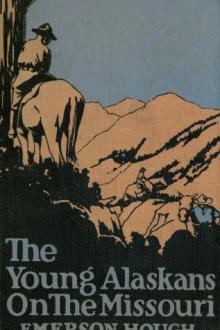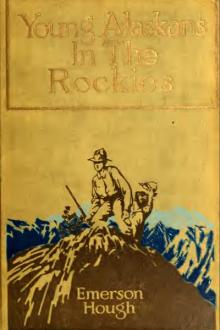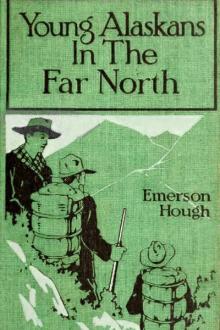The Young Alaskans on the Missouri, Emerson Hough [books to read as a couple .txt] 📗

- Author: Emerson Hough
- Performer: -
Book online «The Young Alaskans on the Missouri, Emerson Hough [books to read as a couple .txt] 📗». Author Emerson Hough
Both cars halted at the summit of a hill before they swung down into the valley of the South Fork. The view which lay before them was one of extreme beauty. The sky was very clear and blue, with countless clean white clouds. Over to the left rose great ragged mountain peaks, on some of which snow still was to be seen. On ahead stretched the road leading into Yellowstone Park. On the further side of the valley, where the winding willow growth showed the course of the stream, rose a black forest ridge stretching indefinitely eastward toward the waters of the main Madison.
Not even Uncle Dick, experienced traveler that he was, could suppress an exclamation of surprise at the beauty of the scene.
“I never get tired of it. Do you, Chet?” said young Bowers to his ranch friend. The latter only smiled.
“It used to be a great beaver country, of course,” went on the former. “All through here the elk come down even yet, though not so many as there used to be. The big fall migration that came down the Madison and Grayling Creek used to come out the northwest corner of the Park more than it does now. I have seen lots of grouse all through here, and if you could wait until the season opened we would have some fun, for I have a fine old dog. But since game is getting scarcer now, maybe we had better just content ourselves with the fishing. I promise you good sport—if you know how to cast a fly.”
“And I’ll promise you they do,” said Uncle Dick, smiling.
The two young local anglers looked at them politely, but said nothing.
CHAPTER XXXI AMONG THE GRAYLINGTurning at a point upon the further side of the valley, where the road forked off for the Yellowstone Park, the two cars passed on to the northward, through two or three gates of wire fences inclosing a ranch that lay in the valley. They found the ranchman himself at home, and most courteous and obliging. He insisted they should camp near his house and stay as long as they liked, where they could get chickens, butter, and eggs without any inconvenience.
“I post my land,” said he, “to keep off the general public, who soon would ruin all the fishing here as they have almost everywhere else, but I have no desire to keep off decent fishermen like yourselves; and I know the young men who are with you now.
“You are just in time for the evening rise. I was over and picked out a couple for breakfast just now. If I were in your place I would go straight across and then work up the stream a little way, to some big holes you will see, then you can fish on down about as far as you like. By being careful at the crossings, some of you can keep to the stream pretty much all the time, but you can fish from the bank if you are patient. Toward dusk there will be fish enough rising from almost any one hole to give you all the fishing you will like.
“I think you will find a very small gray hackle will be good. Sometimes they take the Professor. Just the other day a man came down here with a little Silver Doctor fly, and they couldn’t keep away from it. Sometimes they take Queen of the Waters—dressed long, like a grasshopper—in the bright time of the day. If they take little flies in the evening, then you use little flies, too. There are certainly plenty of the grayling there.”
On any stream but this the number of rods now present would have spoiled the sport for some one, but so extensive was the good fishing water that there was room enough for all six of those who intended to fish—Billy said he would go along and carry the basket for Jesse, and Con O’Brien laughed at the idea of fishing, as he had already had so much that summer; so he went with Uncle Dick. They broke into three parties, one each of the men going along with one of the young anglers, although Chet and his friend were so used to the stream that they needed no advice. These two for a time did not fish at all, but showed the newcomers how and where the sport would be found.
The prediction of the rancher was more than verified. The day had been warm, and now, as the cool of the evening came, the grayling began to rise. At the heads of the bluffs where the current swept in they could be seen breaking almost continually, taking in some small floating insects. Inside of a few minutes each of the anglers was fast to a fine fish; and after that one strike after another followed fast and furious.
“You will have to be careful, son,” said Billy Williams to Jesse, who had raised three fine grayling and lost them all. “The mouth of a grayling is very tender. You can’t fight him as hard as you can a trout. Let him run. When he gets that big black fin up crossways of the stream he pulls like a ton. After a while he will begin to go deep; then you want to lift him gently all the time, until in a few minutes you can get the net under him. I would rather fish grayling than trout, although some think trout fishing is more fun.
“Now look at that fellow jumping over there under the bushes. He’s rising right in the same place. You walk around there at that little sand bar, and float your fly right over him and see what happens.”
Jesse did as instructed, Billy following a little distance behind him. Whipping his fly backward and forward a few times to dry it well, Jesse, who was really a good fisherman for his years, managed to land the fly just short of the bushes, so that it floated down directly over the rising fish.
There came a sudden splash and an excited shout from Jesse. “I’ve got him!” exclaimed he.
“Maybe so,” said Billy. “You had them other three, too, but you didn’t get them in the basket. Now you go easy, young man, and put this one where I can get my hands on him.”
Thus warned, Jesse played the fish gently and carefully, allowing it to run down into the deep water, but keeping his rod tip up all the time and giving line when the fish surged too hard with the current. After several minutes of careful work Billy waded in knee deep and slipped the landing net under the fish—a beautiful specimen, of a pound and a half, clean, fat, and very beautiful with its great spotted fin.
“There you are, son,” said he. “That’s your first grayling, isn’t it?”
“It’s my first one of this sort,” said Jesse, bending over the fish. “You know, I didn’t catch either of those over on the Red Rock. Of course, I have caught them up North on the Bell River, on the Arctic Circle, but they are a deep-blue color up there and this fish is white, or, anyhow, gray. He is just the same shape as far as I can see.”
“Well, get back at your work now,” said Billy. “This is the only grayling stream left in the West. You are on it at the right time of the year and the right time of the day. Ten years from now may be too late. So catch a few—but not too many.”
“You needn’t fear,” said Jesse. “If either of us boys brought in more than half a dozen, Uncle Dick would give us a good calling down.”
“Well, that’s right enough, too,” said Billy. “The state limit is twenty pounds a day, but that’s too high. If everybody got twenty pounds they would soon all be gone. Yet on the spawning run above, on the stream up here, I have seen fellows stand on the bank and snake out strings of them as long as a long willow would hold. I have known one man to say he had caught ninety grayling out of one hole. Well, that’s where they go.”
They wandered along slowly in the late afternoon, passing around one willow plant to the next, usually fishing at some place where the grassy meadow ran clean to the bank of the stream. They did not lack in sport, and before long Jesse had a half dozen fine fish in his basket; then, sighing, he said regretfully he thought he ought not to fish any longer.
“I will not urge you to,” said Billy Williams. “‘Most anybody else would. But if you have got enough, let’s go back to camp. We have got to feed ourselves, of course, and give plenty to the ranchman if he will take them; he may have friends to whom he would like to send a mess.”
At dusk that evening they all gathered around their little camp fire, which they had built not very far from the hospitable ranchman’s house, in acceptance of his kind invitation. Soon Billy and Con had grayling frying, with enough and to spare for all, since Rob had taken a half dozen fish, Uncle Dick as many, and John had come in with seven—one of them rather small, as he explained it. The two young ranchmen had baskets equally heavy, for, as they explained, they had neighbors who did not like to eat the Henry’s Lake trout, but preferred grayling, so they thought it wise to take some home with them.
“Well I did go a little light on the fishing, fellows,” said Uncle Dick, “because I want you to stay here one more day before we start out for Bozeman. That means two nights in camp, which will bring us into Bozeman just past the middle of the month, with our summer’s job pretty well whipped.”
“Which way are we going from Billy’s, Uncle Dick?” demanded Jesse, with his usual curiosity.
“Not yet decided,” replied the other. “Wait until we get up there. We still have a little work to do in studying out the return trip of Meriwether Lewis and William Clark in the summer of 1806.”
That night they had what John called a map party on the table in the friendly ranchman’s home. He and the two young Westerners joined them all in examining the maps and the great river from St. Louis.
“That’s something of a journey, I should say!” commented the ranchman. “I’ll warrant you have learned a good many things you did not know before. Some things in here I didn’t know before, myself.”
“It’s much pleasanter,” said Rob, “to follow out a country on the ground than it is to do it on the map. Not all maps are correct—except John’s, here! But no matter how good a map is, it never means anything to you until you have followed it out on the ground. Just look here, for instance, at the great crooked sweep of the Continental Divide. Yet here we have crossed three passes over the Continental Divide within the last three days—Red Rock, Raynolds, and Targhee—and the Targhee divides the Madison, which is Atlantic water, from Henry’s Lake, which is Pacific water.”
“Yes,” nodded Uncle Dick. “There are not many more interesting countries, geographically speaking, than this right where we are, at the head of the great river. Lewis and Clark crossed the Rocky Mountain Divide seven times, at six different places—up North there. They crossed the Lemhi Pass, both of them. Then they crossed the Divide twice more into the Bitter Roots, then crossed it again on the Lolo Trail. Then they came back over that when they went East, and





Comments (0)